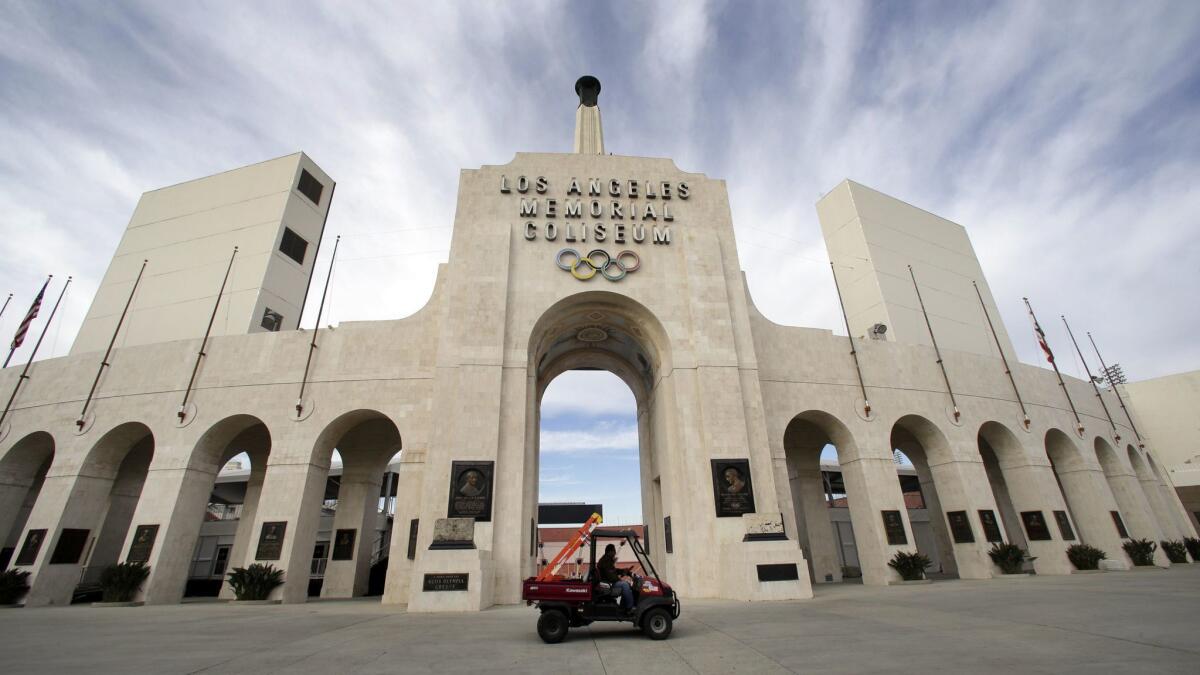Editorial: United Airlines Memorial Coliseum is crass and depressing, but a deal is a deal

Is it an affront to veterans to change the name of the Los Angeles Memorial Coliseum, a publicly owned historic landmark and sports venue, to the United Airlines Memorial Coliseum?
Los Angeles County Supervisor Janice Hahn certainly thinks so. And as president of the Los Angeles Memorial Coliseum Commission she is calling for USC to renegotiate the 16-year, $69-million deal that it struck with United Airlines, leaving the hallowed entrance arches of the Coliseum unbesmirched by brand names and corporate logos.
And to this extent, at least, we agree: It is crass and just generally depressing that so many sports venues have sold their names to the highest bidder, so that we actually have to talk about Petco Park and Sleep Train Arena and Dunkin’ Donuts Center. Corporate America is inexorably buying its way into our consciousnesses, slapping company names not only onto stadiums but also onto transit stops and concert series and whatever else it can come up with (in return for financing that is often badly needed).
But the time for Hahn to have brought up these concerns is long past. The Coliseum Commission, the nine-member panel of city, county and state representatives overseeing the arena, gave its approval to a new corporate-adorned name for the 1923 stadium back in 2013 when it agreed to a lease agreement with USC that included the authority to sell the naming rights. The lease arrangement turned over control of the Coliseum to USC because the commission itself was mired in corruption allegations and the Coliseum was facing insolvency.
The time for Hahn to have brought up these concerns is long past.
Since that deal was struck, USC has undertaken a massive $300-million renovation of an aging stadium it doesn’t even own, with the reasonable understanding that it could recoup some of its investment by selling the naming rights. Another good time to have raised objections? When the deal with United Airlines was first reported in May 2017 by the Los Angeles Times and other news outlets.
As it is, the official reopening, along with the name change, is just months away, and it’s in extremely bad faith to try to pull the rug out from under the USC deal now. United has said that changing the stadium’s name to what the parties initially agreed on is “the key provision” of the agreement and has suggested that it might walk away from the naming deal if USC can’t abide by the original terms. That would leave USC with a big financial hole. The university and the commission are working on finding a compromise, but you can bet United will not view “United Airlines Field at Los Angeles Memorial Stadium” — which was Hahn’s suggestion — as worth $69 million.
Hahn’s spokeswoman said the supervisor wasn’t aware of the proposed name change until she was appointed to the Coliseum Commission a year and a half ago. That’s probably why she’s jumping in late. But still: The deal is the deal, and her proposed renegotiation could upend it.
Nor is it clear how much of a groundswell of disgust there is with the name change; Hahn says she has nearly 900 names on a petition opposing it. Still, United and USC were smart enough not to try and remove “memorial” from the name.
Enter the Fray: First takes on the news of the minute »
Whether we like it or not — and we don’t, particularly — selling off naming rights to corporations has become a fairly common strategy for financing the construction of public sports venues without putting the full burden on taxpayers or the sports team. Typically, the deal is struck before the venue is built, so that fans get used to the idea of, say, the Banc of California Stadium (built on the former site of the Los Angeles Memorial Sports Arena) from the start. It’s an international phenomenon as well. You think United Airlines Memorial Coliseum sounds funny? Try the Mitsubishi Forklift Stadion, a stadium in the Netherlands.
It seems unlikely we are going to turn the clock back on corporate naming rights. Nor would we necessarily want to if it meant taxpayers would have to foot the entire bill or that sports teams would leave town.
But if some public assets should hold onto their names for historical or cultural reasons, that’s a discussion worth having before their naming rights are sold.
Follow the Opinion section on Twitter @latimesopinion and Facebook
More to Read
A cure for the common opinion
Get thought-provoking perspectives with our weekly newsletter.
You may occasionally receive promotional content from the Los Angeles Times.






